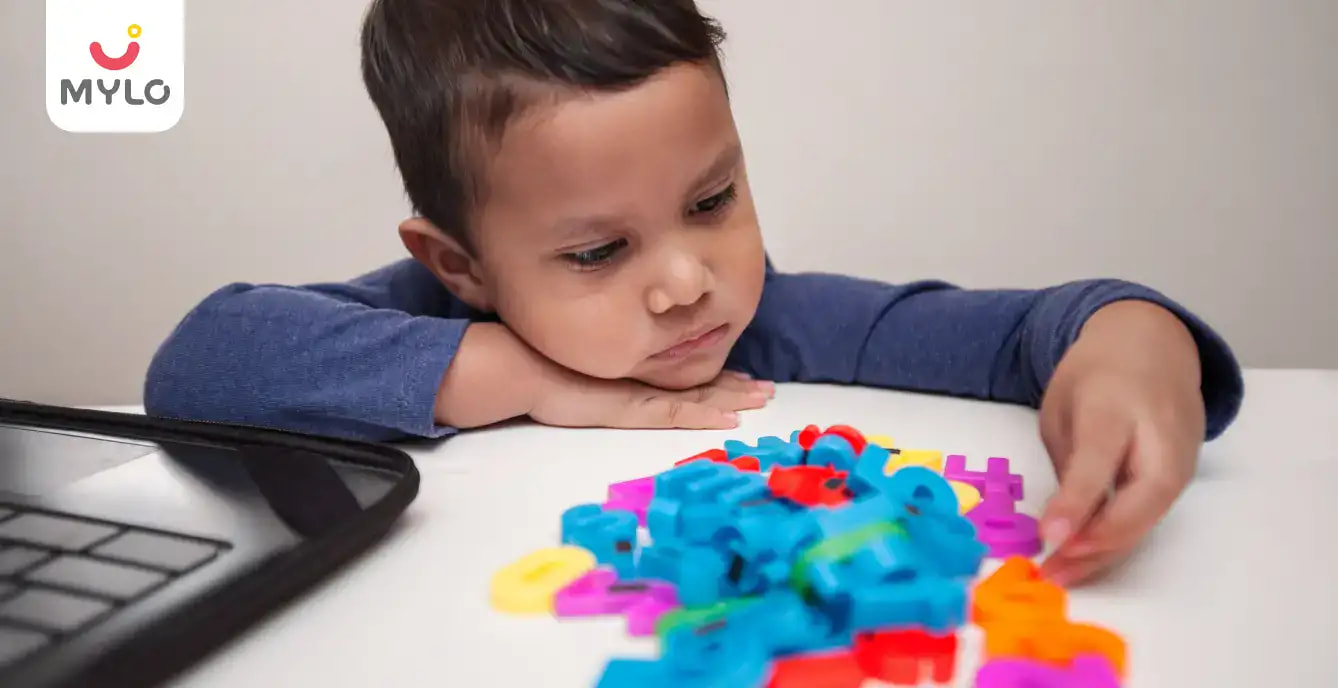- Home

- Developmental Disorders

- Signs & Symptoms of ADHD in Children
In this Article
Developmental Disorders
Signs & Symptoms of ADHD in Children
Updated on 3 November 2023
Is your child running around more than other kids? Does your child find it difficult to sit still? Read on to find out the ADHD symptoms in children and ADHD symptoms and treatment. Attention Deficit Hyperactivity Disorder (ADHD) is one of the common behavioral issues seen in children below the age of 12 years. It also has a late onset in certain adults.
Parents of the child should be attentive to the various signs and symptoms of ADHD in children. Appropriate treatment with the correct dosage of medications and therapy is required for the efficient management of this disorder.
What is ADHD?
ADHD refers to Attention Deficit Hyperactivity Disorder. ADHD can have its onset in infancy, although it is rarely recognized until a child is toddler age. More commonly, infants with ADHD are active in the crib, sleep little and cry a great deal.
In school, children with ADHD may be very impulsive and answer questions before it is finished and often end up being wrong. They are unable to do turn-taking and are very impatient. At home, they do not rest for even a minute and it is extremely difficult to put them to sleep.
Children with ADHD are very prone to accidents as they do not mind their steps. A significant percentage of children diagnosed with ADHD show behavioral symptoms of aggression and defiance. School difficulties, both learning and behavioral, are common with these children. They can also face various learning difficulties.
What are the most common signs & symptoms of ADHD in children?
According to the Diagnostic and Statistical Manual 5 (DSM 5), published by the American Psychiatric Association (APA). The following are some of the signs and symptoms of ADHD to look out for in your child:
-
Fails to give close attention to details
-
Has difficulty sustaining attention in tasks or play activities
-
Does not seem to listen when spoken to directly
-
Does not follow through on instructions
-
Has difficulty organizing activities
-
Dislikes tasks that require sustained mental effort
-
Loses or misplaced things easily
-
Easily distracted by outside happenings
-
Often forgetful in daily activities
-
Fidgets often
-
Tapping hands and feet or squirming in the seat
-
Leaves seat during the class
-
Runs about when it is inappropriate
-
Acting often as if "driven by a motor"
-
Talks excessively often
-
Blurts out the answer before the question is complete
-
Difficulty in turn taking
-
Interrupts or intrudes on others
This ADHD symptoms in children checklist provides you with a way to navigate around the situation. All of these ADHD signs and symptoms may or may not be present in your child. Not all such children show all of these symptoms as DSM 5 specifies that most of these symptoms must be present by the age of 12 years. The subtypes include predominantly inattentive, predominantly hyperactive/impulsive, or a combined presentation. Self-diagnosis is not recommended and you are required to consult with an RCI-registered clinical psychologist for a proper formal diagnosis of ADHD.
What Causes ADHD in children?
There are various causes of ADHD in children such as:
1. Genetic Factors:
Various twin studies have shown that identical twins are more prone to show ADHD than fraternal twins.
2. Neurochemical Factors:
Malfunction in the dopamine and norepinephrine is said to be responsible for a majority of ADHD symptoms in children.
3. Developmental Factors:
Higher rates of ADHD are seen in infants who are born prematurely and mothers who had an infection during pregnancy.
4. Psychosocial Factors:
Abuse during childhood, neglect, and severe maltreatment are potential causes contributing to developing ADHD in later childhood years.
How to treat and manage ADHD in children?
Ritalin is one of the most popular medications prescribed to children diagnosed with ADHD. It is advised you should not start any medication unless your doctor prescribes the same. In addition, behavior therapy is advised to manage the symptoms in the long run. It is generally seen that only a combined effect of the proper medicine and therapy can help manage the various signs and symptoms of ADHD in children.
A child may show several of the symptoms of ADHD by the time they turn 12 years. It is up to the parents to regularly monitor and check with their doctor if their child is having ADHD to ensure proper treatment is given to them at the right time.



Written by
Roohi Kalra
Get baby's diet chart, and growth tips

Related Articles
Related Questions
Hello frnds..still no pain...doctor said head fix nhi hua hai..bt vagina me pain hai aur back pain bhi... anyone having same issues??

Kon kon c chije aisi hai jo pregnancy mei gas acidity jalan karti hain... Koi btayega plz bcz mujhe aksar khane ke baad hi samagh aata hai ki is chij se gas acidity jalan ho gyi hai. Please share your knowledge

I am 13 week pregnancy. Anyone having Storione-xt tablet. It better to have morning or night ???

Hlo to be moms....i hv a query...in my 9.5 wk i feel body joint pain like in ankle, knee, wrist, shoulder, toes....pain intensity is high...i cnt sleep....what should i do pls help....cn i cosult my doc.

Influenza and boostrix injection kisiko laga hai kya 8 month pregnancy me and q lagta hai ye plz reply me

RECENTLY PUBLISHED ARTICLES
our most recent articles

Diet & Nutrition
গর্ভাবস্থায় আলুবোখরা: উপকারিতা ও ঝুঁকি | Prunes During Pregnancy: Benefits & Risks in Bengali

Diet & Nutrition
গর্ভাবস্থায় হিং | ঝুঁকি, সুবিধা এবং অন্যান্য চিকিৎসা | Hing During Pregnancy | Risks, Benefits & Other Treatments in Bengali

Women Specific Issues
স্তনের উপর সাদা দাগ: লক্ষণ, কারণ এবং চিকিৎসা | White Spots on Nipple: Causes, Symptoms, and Treatments in Bengali

Diet & Nutrition
গর্ভাবস্থায় পোহা: উপকারিতা, ধরণ এবং রেসিপি | Poha During Pregnancy: Benefits, Types & Recipes in Bengali

Diet & Nutrition
গর্ভাবস্থায় মাছ: উপকারিতা এবং ঝুঁকি | Fish In Pregnancy: Benefits and Risks in Bengali

Diet & Nutrition
গর্ভাবস্থায় রেড ওয়াইন: পার্শ্ব প্রতিক্রিয়া এবং নির্দেশিকা | Red Wine During Pregnancy: Side Effects & Guidelines in Bengali
- ইনার থাই চ্যাফিং: কারণ, উপসর্গ এবং চিকিৎসা | Inner Thigh Chafing: Causes, Symptoms & Treatment in Bengali
- গর্ভাবস্থায় ব্রাউন রাইস: উপকারিতা ও সতর্কতা | Brown Rice During Pregnancy: Benefits & Precautions in Bengali
- Velamentous Cord Insertion - Precautions, Results & Safety
- Unlock the Secret to Flawless Skin: 7 Must-Have Qualities in a Face Serum
- Unlock the Secret to Radiant Skin: How Vitamin C Serum Can Transform Your Complexion
- Gender No Bar: 10 Reasons Why Everyone Needs a Body Lotion
- Unlock the Secret to Radiant Skin How to Choose the Perfect Body Lotion for Your Skin Type
- Top 10 Reasons to Apply a Body Lotion After Every Bath
- Communication in Toddlers: Milestones & Activities
- How to Improve Vocabulary for Toddlers?
- A Comprehensive Guide to Understanding Placenta Accreta
- Vulvovaginitis in Toddlers Causes, Symptoms and Treatment
- A Comprehensive Guide to Understanding Cerebral Palsy in Children
- Bitter Taste in Mouth During Pregnancy: Understanding the Causes and Remedies


AWARDS AND RECOGNITION
Mylo wins Forbes D2C Disruptor award
Mylo wins The Economic Times Promising Brands 2022
AS SEEN IN
















At Mylo, we help young parents raise happy and healthy families with our innovative new-age solutions:
- Mylo Care: Effective and science-backed personal care and wellness solutions for a joyful you.
- Mylo Baby: Science-backed, gentle and effective personal care & hygiene range for your little one.
- Mylo Community: Trusted and empathetic community of 10mn+ parents and experts.
Product Categories
baby carrier | baby soap | baby wipes | stretch marks cream | baby cream | baby shampoo | baby massage oil | baby hair oil | stretch marks oil | baby body wash | baby powder | baby lotion | diaper rash cream | newborn diapers | teether | baby kajal | baby diapers | cloth diapers |





